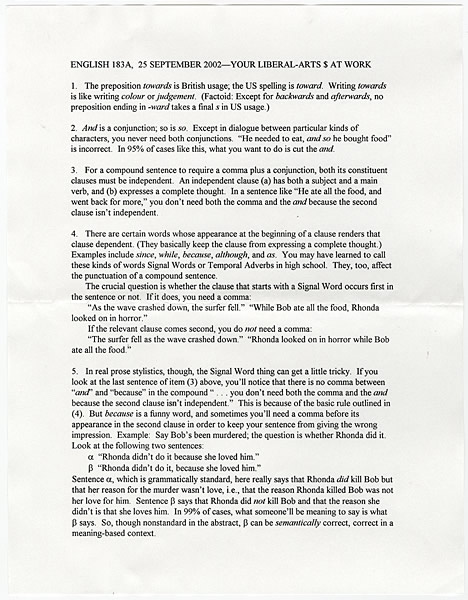What advantage, I recently asked a trilingual writer, could you possibly find in using such an improvised, confusing, irregular patchwork of a language as English? She replied that this very improvisation, irregularity, and even confusion comes from the vast freedom of expression (and of invention of new expressions) that English offers over other European tongues. This goes even more so for American English, the variant with whose combination of carefully shaded nuances and smashing colloquialisms David Foster Wallace so dazzled his readers. Like many writers, Wallace also taught writing, but those of us not lucky enough to receive his direct instruction can still behold his teaching materials, archived online at the University of Texas at Austin’s Harry Ransom Center.
See, for instance, Wallace’s handout on five common usage mistakes, from his Fall 2002 section of English 183A at Pomona College (an advanced fiction writing class, taught last Spring by Jonathan Lethem). “The preposition towards is British usage; the US spelling is toward.” Fair enough. “And is a conjunction; so is so,” he continues. “Except in dialogue between particular kinds of characters, you never need both conjunctions.” Handy to know! Then, things get more technical: “For a compound sentence to require a comma plus a conjunction, both its constituent clauses must be independent.” As Wallace goes deeper, I feel even more sympathy for those who learn English as a second language, as I did when I read “Tense Present,” his Harper’s review of Bryan A. Garner’s A Dictionary of Modern American Usage. If the hardcore grammar talk tires you, feel free to peruse the Ransom Center’s other artifacts of Wallace’s time in the classroom—which we covered in a post last week—such as his syllabus for English 102: Literary Analysis, his guidelines for papers, and the marginalia in his copy of Carrie.
Related Content:
30 Free Essays & Stories by David Foster Wallace on the Web
David Foster Wallace: The Big, Uncut Interview (2003)
David Foster Wallace’s 1994 Syllabus
Colin Marshall hosts and produces Notebook on Cities and Culture and writes essays on literature, film, cities, Asia, and aesthetics. He’s at work on a book about Los Angeles, A Los Angeles Primer. Follow him on Twitter at @colinmarshall.



I like how he thinks “backwards” and “afterwards” are prepositions. Some grammar genius he was. And anyone who was bamboozled by his ridiculous Harper’s piece should read this: http://www.languagehat.com/archives/000510.php
I love this DFW piece but you can’t read the original, or print or download in readable form, unless you purchase a digital copy from the Harry Ransom Center at The University of Texas. The copy you have posted is not really legible, right. I have wanted to share this with my writer’s group. Archival Collections are like this, making a business of their stewardship of original materials like Wallace’s work.
No need to feel pity for those for who English is a second language,we’re in most cases a lot better acquainted with the English grammar than most of the native speakers.For example,none of the things listed above in DFW’s handout are a surprise to me,but they would definitely be for 99% of my native speaker colleagues here in Australia
Depending upon their placement, Steve, afterward and backward are prepositions.
The english language as spoken by the experts: get that cake off of the shelf.
The pianist no longer performed or played live: he/she concertized. I have read and heard this last weekend.
And the other recent classic: two full stops, one on top of the other, are not a full colon, they are two full stops, so the next word starts with a capital letter, even if it isn’t a Name.
There are many errors in otherwise literate websites because people either don’t proofread before hitting “Enter” or they put too much faith in spellcheck types of software that don’t draw attention to misspellings that result in legitimate words.
To Linda Wilson: If you click on the image of the page, it will bring up a larger copy. Still not legible enough? Ctrl+A/Copy, then paste into a Word document which you can then resize to make it quite legible. Try it, you’ll like it!
Like this article! But I quibble with the statement that “this very improvisation, irregularity, and even confusion comes from the vast freedom of expression (and of invention of new expressions) that English offers over other European tongues.” I would say it the other way round: the vast freedom of expression that English offers is in fact greatly fostered by this very “improvisation, irregularity, and even confusion” of modern English.
“Factoid” means a false fact, a non-fact masquerading as a fact, as an android is a human-looking non-human. It’s rarely used correctly (unfortunate since the world is full of factoids) but disappointing that DFW also misused this, and it’s pretty amusing for him to commit such a middle-brow mistake while preaching good language use.
DFW’s comment about punctuation in compound sentences is confused: a compound sentence always consists of two independent clauses, by definition.
American spelling is incorrect
Only a non-native speaker would produce such a trainwreck as ‘No need to feel pit for those for who [sic] English is a second language’. But go on. Please tell us how superior you are to the native speakers of Australia…